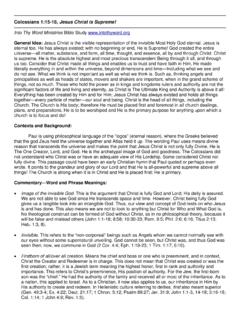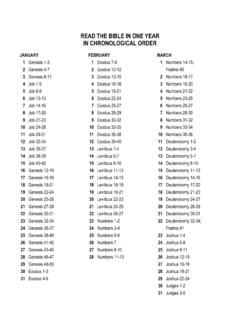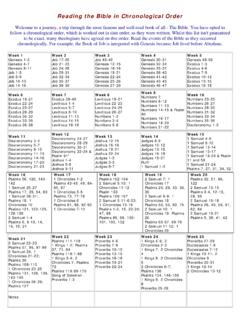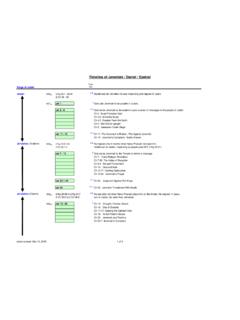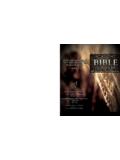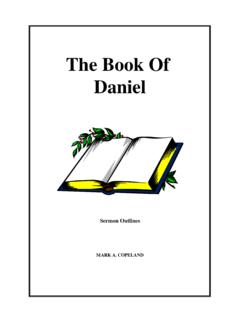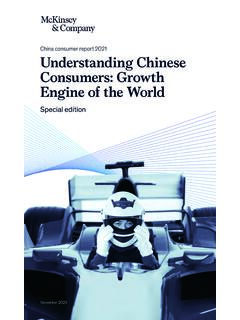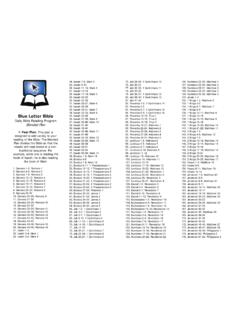Transcription of What Are the Types of Literature Genres in the Bible?
1 What Are the Types of Literature Genres in the Bible? Into Thy Word Ministries The Bible is not one book; it is a library of sixty-six books that were written over a period of more than 1,500 years by many different authors. These authors were inspired by the Holy Spirit in their thinking and writing. Thus, the Bible is the inspired Word of God without error. It also has the human touch from its authors. Paul is different from David, who is different from James or Moses. So, their style and personality come out to us. These create the marvelous depth and wonder of Scripture and how God chooses to use us when He does not need to.
2 The Bible is Literature , as is any book, filled with many kinds or Types of language. It has Law, History, Wisdom, Poetry, Gospel, Epistles, Prophecy, and Apocalyptic Literature . Biblical Genres Include: Law: This contains the instructions and precepts of Moses, such as Leviticus and Deuteronomy. Law is God's law , and is the expression of His sovereign will and character. The writings of Moses contain a lot of Law. God provided the Jews with many laws (619 or so). These laws defined the proper relationship with God, to one another, and with the world (the alien), as well as for worshipping God, governing the people, priestly duties, what to eat and not eat, how to build the temple, proper behavior, manners, and social interaction, etc.
3 The Ten Commandments are often known as The Law; so are Exodus, Leviticus, Numbers, and Deuteronomy. In the New Testament, the Sermon on the Mount is considered law and the fulfillment of the law, and Paul s calls to the church are law in their Literature form. Most Christians have a distorted view of the law and think it does not apply to us. Jesus repeated and affirmed the Ten Commandments and the Law of Moses. The law points to our depravity and need for a Savior. Without the law, there would be no relationship to God or need for Christ to save us. Christ fulfills the law and thus we are not bound to its curse, but we must acknowledge its role in our lives as the pointer to the Cross and the mirror to our soul.
4 History or Narrative: These are the stories and the epics, and include: Genesis, Exodus, Numbers, Joshua, Judges, Ruth, 1 and 2 Samuel, 1 and 2 Kings, 1 and 2 Chronicles, ezra , Nehemiah, Esther, Jonah, and Acts. Almost every Old Testament book contains history. Some books of the Bible are grouped together and commonly referred to as the History (Joshua, Kings, and Chronicles); these books tell us the history of the Jewish people from the time of the Judges through the Persian Empire. In the New Testament, Acts contains some of the history of the early church, and the Gospels also have history; Jesus life is told as history.
5 Even the Epistles have history as they chronicle events. There is also anther sub-category of narrative called Romance; this is narrative written also as a love story such as Ruth and Song of Solomon. Wisdom: This is the Literature of maxims and sayings, including Job, Proverbs, and Ecclesiastes. Wisdom Literature focuses on questions about the meaning of life (Job, Ecclesiastes) and on practical living and common sense (Proverbs and some Psalms). This Literature contrasts our faulty human wisdom to God s reasoning perfection. Thus, when we live for our own will and not His, we will experience grief and frustration, not because God is vengeful and angry, but because we led ourselves that way out of our pride and arrogance.
6 This Literature warns us of our evil nature and desires. Poetry: These are the prose and rhyme books such as Psalms, Song of Solomon, and Lamentations. Poetry is found mostly in the Old Testament and is similar to modern poetry. Since it is a different language of Hebrew, the Bible s poetry can be very different because it does not translate into English very well. Poetry that we are used to is usually based on parallelisms, rhythm, or various Types of sound mixings, as is our music. Hebrew poetry is based on a tempo of stanzas and phrases re-told differently called synonymous parallelism , conveying the same ideas and meaning in contrasting or similar ways.
7 Some called synthetic parallelism, also have extra ideas and words inserted. Antithetic parallelism is mostly contrasting stanzas, and is very predominant in Proverbs. Some Bible books are all poetry (Psalms, Song of Songs, and Lamentations), and some books only have a few verses such as in Luke. Gospel: This word means the good news that we received through salvation by the work and life of God s Son, Jesus Christ. When the Gospels were first written in the first century, it was a brand new form of Literature . The four Gospels (Mark, Matthew, Luke, and John) contain a bit of all the literary Types with the primary purpose of expressing faith in Christ and what He has done on our behalf.
8 In these works, the stories are not necessarily in chronological or sequential order, except for Luke. In this type of Literature , we find what is called a Parable. These are the sayings of Jesus that are narrative and instructional, contained in the Gospels. Each of the gospels presents the teachings, ministry, death, and resurrection of Jesus in a distinctive way, but not contradictory, and for a specific audience. Matthew was written to Jews, and Luke to Greeks, both with different ways of reasoning and thinking. Think of the Gospels like the facets of a diamond, giving more depth and meaning.
9 Parables: These are the sayings of Jesus told in a short story or illustration form that are narrative and instructional; they teach a truth, and are contained in the Gospels. Usually, these are from everyday life examples that may have taken place or may not. At times, such as in the Parable of the Sower, Jesus was possibly pointing to it as He taught. These had a deeper purpose than the face value of the illustration, thus it took some thinking and a desire to learn in order to understand them. Perhaps, He used them to keep people of impiety and without intent of faith from bothering Him; or, perhaps He wanted to challenge the skeptics and people who were unresponsive.
10 Epistle: This refers to the 21 letters in the New Testament written to a specific audience that are also practical for us today such as Romans, Corinthians, Galatians, Ephesians, Philippians, Colossians, Thessalonians, Timothy, Titus, Philemon, Hebrews, James, Peter, John, and the first three chapters of Revelation. Epistles are the personal letters from the Apostles to their churches. These letters are both different and similar to the letters of their time. Most challenge the congregation to wake up out of their selfish ways and to concentrate on Christ in specific ways and clarifications.

